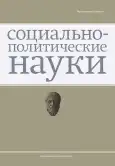Methodological Principles of the Activity-phenomenological Concept in the Study of Social Mechanisms for Forming Trust in Transforming Economic Relations
- Authors: Voevodina E.V.1, Shihgafizov P.S.1, Shtepa S.E.1
-
Affiliations:
- Financial University under the Government of the Russian Federation
- Issue: Vol 12, No 4 (2022)
- Pages: 55-62
- Section: Articles
- URL: https://journals.eco-vector.com/2223-0092/article/view/535769
- DOI: https://doi.org/10.33693/2223-0092-2022-12-4-55-62
- ID: 535769
Cite item
Abstract
Full Text
About the authors
Ekaterina V. Voevodina
Financial University under the Government of the Russian Federation
Email: evvoevodina@fa.ru
Cand. Sci. (Sociol.), Associate Professor; associate professor at the Department of Sociology Moscow, Russian Federation
Pirmagomed Sh. Shihgafizov
Financial University under the Government of the Russian Federation
Email: psshikhgafizov@fa.ru
Cand. Sci. (Sociol.); associate professor at the Department of Sociology Moscow, Russian Federation
Sergey E. Shtepa
Financial University under the Government of the Russian Federation
Email: seshtepa@fa.ru
assistant at the Department of Sociology Moscow, Russian Federation
References
- Avdeeva D.A. The role of trust in the economy. Sociodigger. 2021. No. 1-2 (7). Pp. 41-43. (In Rus.)
- Belyanin A.V., Zinchenko V.P. Trust in the economy and public life. Moscow, 2010. 164 p.
- Zelenkov M.Yu., Tyurikov A.G. Model of challenges to trust in the modern Russian Federation. Sociodynamics. 2022. No. 2. Рр. 26-43. (In Rus.)
- Ilyin E.P. Psychology of trust: Monograph. St. Petersburg, 2013. 490 p.
- Intercultural communication in the global world: Modeling, efficiency, trust. A.G. Tyurikov (ed.). Moscow, 2022.
- Mukomel V.I., Ryzhova S.V. Trust and distrust in international relations. Sociological Research. 2017. No. 1. Pp. 37-46. (In Rus.)
- Ten Yu.P. Trust as a factor contributing to overcoming cross-cultural barriers in international business. Proceedings of the Southwest State University. Series: Economics, Sociology and Management. 2021. No. 5. Рр. 261-270. (In Rus.)
- Fukuyama F. Trust. Social virtues and wealth creation. In: The new post-industrial wave in the West: Anthology. V.L. Inozemtseva (ed.). Moscow, 1999. 631 p.
- Shapovalov V.Yu. Characteristic features of business cultures of the West and East: Their influence on the development of business culture in modern Russia. Historical and Socio-educational Thought. 2010. No. 4 (6). Pp. 111-116. (In Rus.)
- Sztompka P. Sociology. Analysis of modern society. Moscow, 2005. 664 p.
Supplementary files








